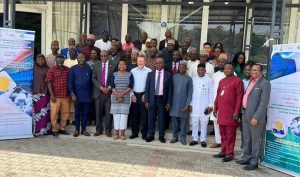As part of its measures to promote energy efficiency and protect Nigeria from becoming a dumping ground for various inferior commodities, the Standard Organisation of Nigeria (SON) has concluded plans to adopt the Minimum Energy Performance Standards (MEPS) for Nigeria’s lighting products.

Nigeria, as a signatory to the Minamata Convention, is obligated to eliminate the use of mercury-added products such as fluorescent, which are inefficient toxic lighting that the entire global community has accepted as needing to be phased out by 2027 because of their health, environmental implications, and because they are not energy efficient.
According to the agency, if these new guidelines are properly implemented, they will help Nigeria achieve its 20% unconditional emissions reduction target contained in its Nationally Determined Contributions (NDCs) and position the country for a more sustainable future.
Speaking on Wednesday, December 13, 2023, in Abuja at an awareness workshop on MEPS organised by SON in collaboration with the Sustainable Research and Action for Environmental Development (SRADev Nigeria), the agency’s director general, Dr. Ifeanyi Okeke, said MEPS are special regulations that have been put in place to set a benchmark of energy efficiency that a product must meet to be sold in the market.
The DG, who was represented at the event by Adewunmi Richards, the director of Laboratory Services at SON, explained that, by setting minimum energy efficiency requirements for lighting products, governments ensure that only energy-efficient options are available for consumption.
He further elaborated that these standards are fundamental to reducing energy consumption, lowering greenhouse gas emissions, and promoting a sustainable future for all Nigerians as the world gradually transitions to cleaner energy sources.
“Nigeria will save about 387 megawatts of power, which is estimated at half a billion dollars, by implementing the MEPS as the world gradually shifts to clean energy,” Dr. Okeke stated.
With the meeting’s theme centred on how to “promote energy efficiency and non-toxic lighting through MEPS compliance,” the SON’s chieftain hinted that these new rules apply to a wide range of products, including appliances such as refrigerators, air conditioners, and televisions, and other electrical appliances.
As a country suffering from massive energy poverty, Dr. Leslie Adogame, executive director of SRADev Nigeria, believes that efficient energy solutions such as LEDs should be deployed as alternatives to supply families with 24-hour energy demands.
Apart from the energy efficiency issue, he also mentioned that one of the major challenges that MEPS intends to address is the presence of mercury in the majority of lighting items to save Nigeria from becoming a haven for counterfeit electrical devices.
“It is one thing to talk about the transition to LEDs, which are energy efficient and mercury-free; it is another thing to have standard-quality materials for use that can last for a reasonable period,” Dr. Adogame said.
He expressed regret over the fact that many goods that don’t have the necessary energy capacity are shipped into Nigeria, which is sad because it’s like creating a problem while trying to solve another.
Stakeholders, according to him, have all accepted the process and are waiting for SON to roll out its implementation to ensure that manufacturers and importers comply with those standards.
The SRADev Nigeria boss assured that with the unveiling of these new regulations, very soon Nigerians will no longer have sub-standard LEDs as currently found everywhere across the country.
MEPS, he revealed, will not only oversee the lamps but even labelling standards because most of the labels are in other languages like Chinese and people cannot read them.
“So, this standard is to take care of all that because we want to sanitise our system by saying farewell to toxic lighting and fluorescent lamps,” he said.
Similarly, MEPS, according to CLASP manager Monica Wambui, pushes consumers closer to energy efficiency.
This, in her opinion, means energy savings because, as electricity customers, “we are always looking at our pockets,” adding that above all, MEPs ensure that mercury is no longer used in lighting products.
She bemoaned the fact that many homes still use fluorescent lights, which contain mercury and are quite harmful.
However, because energy-efficient bulbs do not contain mercury, they not only preserve human health but also promote environmental safeguards, she explained.
“It is also helping in reducing and achieving the carbon emission target because energy efficiency contributes to reducing carbon emissions and helping to achieve the 1.5 degree Celsius that has been set for global warming,” Wambui said.
By Etta Michael Bisong, Abuja
